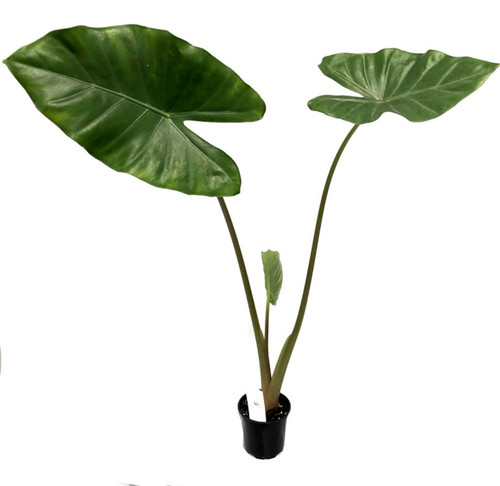Introduce a touch of the exotic to your home or garden with the remarkable Alocasia species Stingray. This unique plant is a true conversation starter, featuring distinctive, stingray-shaped leaves with long, slender tails that create a striking visual appeal. Perfect for indoor spaces or shaded outdoor areas, Alocasia Stingray thrives in bright, indirect light and appreciates a humid environment, making it an ideal choice for bathrooms, patios, or greenhouses. Beyond its captivating appearance, this plant is known for its robust growth and easy-care nature, requiring minimal maintenance while providing maximum impact. Elevate your plant collection with the extraordinary Alocasia Stingray, and enjoy the lush, tropical vibe it brings to any space. Its bold, architectural foliage will transform your home or garden into a stylish sanctuary, offering a glimpse of the exotic right in your own backyard.
Alocasia is a genus of broad-leaved, rhizomatous, or tuberous perennial flowering plants from the family Araceae. There are 97 accepted species native to tropical and subtropical Asia and Eastern Australia. Around the world, many growers widely cultivate a range of hybrids and cultivars.
The large, cordate, or sagittate leaves grow to a length of 8 to 35 inches on long petioles. Their araceous flowers grow at the end of a short stalk, but are not conspicuous; often hidden behind the leaf petioles.
The corms of some species can be processed to make them edible, however, the raw plants contain raphid or raphide crystals of calcium oxalate along with other irritants (possibly including proteases) that can numb and swell the tongue and pharynx. This can cause difficulty breathing and sharp pain in the throat. Lower parts of the plant contain the highest concentrations of the poison.
Prolonged boiling before serving or processing may reduce risk of adverse reactions. Additionally, acidic fruit such as tamarind may dissolve the raphides altogether. It's important to note, however, that this species varies in toxicity, and can still be dangerous to ingest, even after taking precautions.
Give credit where credit is due: Wikipedia 2024
FlowerPotNursery Stingray Elephant Ear Alocasia sp. Stingray 4" Pot
The Flower Pot Nursery
$13.99
- SKU:
- ASSA040624










